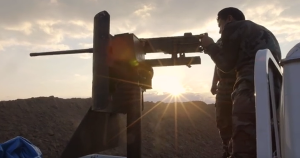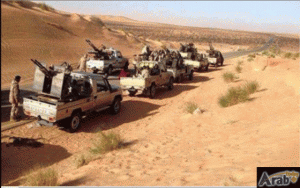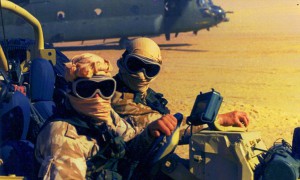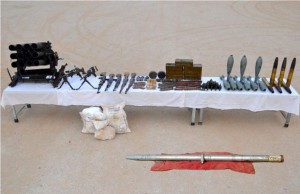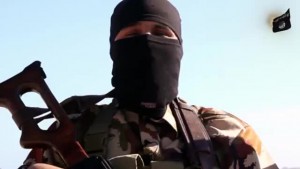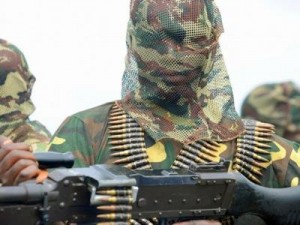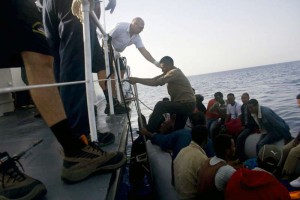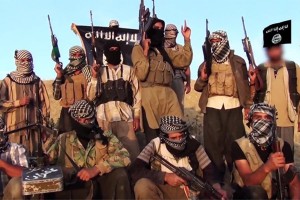This type of direct support from abroad has strengthened the sense of many politicians and military leaders in eastern Libya that they don’t need to strike a power-sharing deal with the forces now supporting the unity government – first and foremost Misrata – in order to have good relations with the US and Europe.
Libya: south Misrata declared military zone
Security forces declared southern Misrata as a military area, imposing a curfew and preventing civilians and journalists from presiding in the area as of 8:00 p.m.
“As part of preparations for a decisive battle against Daesh militants, the Libyan forces will start as of today testing heavy weaponry in southern Misrata, Libya’s third biggest cities” Misrata operations room said late on Saturday.
A new military operation was launched by Libyan forces after Daesh attacked Sadada Gate and took over the Abu Grein crossroads, which lies 120 kilometres south of Misrata.
arabstoday.net
Libya: UK’s special forces target Isis communications with black ops electronic warfare
UK special forces have launched a massive electronic warfare campaign on Islamic State (Isis). The “black ops” operation reportedly carried out by a crew of the RAF Rivet Joint spy plane has shut down the extremist group’s communications network in Libya.
The forces deployed sophisticated “jamming strikes” on the Isis (Daesh) stronghold of Sirte, a town located on the Mediterranean coast, 400 miles from Malta, the Daily Mail reported. The strike involved the RAF crew turning off IS’s preferred signal frequencies.
A source is quoted as saying: “All enemy communications including mobile phones and the internet are vulnerable to interception. It is best practice to monitor these means and gather information, then occasionally use jamming strikes to spread confusion among their ranks at vital times. There is a shortage of human sources within IS in Libya so whatever intelligence we can gather from listening to their conversations, the better.”
A GCHQ cyberwarfare squad on board the Royal Navy survey vessel HMS Enterprise kept track of the response to the latest jamming strike. They also observed the online exchanges between key IS leaders who are currently believed to hold command over 6,000 militants in Libya.
“They were very angry and couldn’t understand what had gone wrong. We jammed the frequencies for 40 minutes – long enough to prove the capability, but not so long that IS realised what was happening,” the source added.
Of late, IS has begun gathering up its online forces in efforts to step up cyberattacks on international governments and organisations. In April, a pro-IS hacker group called United Cyber Caliphate leaked a hit list which included the names and personal details of thousands of New Yorkers.
More recently, another IS-affiliated hacker group, Islamic State Hacking Division, boasted of having a mole within the Ministry of Defence and threatened to leak British intelligence data in order to create a more significant presence in cyberspace.
Britain is one among several international governments to have recently increased focus in identifying and neutralising IS in cyberspace.
Algeria and terrorism: 25 traditional canons, 2 homemade bombs destroyed in Skikda
Twenty-five traditional canons and two homemade bombs have been destroyed Friday by a detachment of the National Popular Army following a search operation in the zone of Ghabet Ettefah in Skikda, said Saturday a communiqué of the National Defence Ministry.
“Following a search operation, as part of the fight against terrorism in the area of Ghabet Ettefah in Skikda (5th Military Region), a detachment of the National Popular Army has discovered and destroyed on 13 May 2016, 25 traditional canons, two homemade bombs, eight kilograms of explosive substances and tools of manufacturing bombs,” said the source.
Moreover, further detachments have arrested “three people supporting terrorist groups in Ghardaïa (4th Military Region).
In Souk-Ahras, Tebessa, and El-Tarf (5th Military Region), units of border guards “thwarted attempts of smuggling of more than 17,206 litres of fuel and seized seven cars used in smuggling.”
Moreover, as part of securing borders and the fight against smuggling, detachments of Army, in coordination with the Customs, “have apprehended during various operations in Bordj Badji Mokhtar, Ain Salah and In Guezzam (6th Military Region), thirteen smugglers of different nationalities and all-terrain vehicles have been seized.”
In Tlemcen (2nd Military Region) and Biskra (4th Military Region), “ten illegal immigrants of different nationalities have been arrested,” the Ministry said.
aps.dz
The US is gearing up for another military campaign in Libya
US special operations troops have been stationed at two outposts in Libya since late last year to try to enlist local support for a possible offensive against ISIS, the Washington Post reported on Thursday, citing US officials.
Two teams totaling fewer than 25 troops are operating from around the cities of Misurata and Benghazi to seek potential allies and glean intelligence on threats, according to officials who spoke on condition of anonymity, the newspaper reported.
ISIS — aka the Islamic State, ISIL, or Daesh — has been building up forces in Libya as a potential “back-up capital” in case the terrorist group is driven out of its main base in Syria. ISIS is thought to have several thousand fighters in Sirte, but the group has had trouble expanding to other areas of Libya.
Still, ISIS has wasted no time building up its operations in the notoriously unstable country — the group has reportedly set up propaganda “media points” in the city and started imposing its strict laws, like requiring women to wear Islamic veils in public and permitting public executions.
The US special operations forces are trying to help local forces fight ISIS while taking advantage of foreign air power, according to the Post.
“These types of activities can be the difference between success and failure in what the administration refers to as areas outside of active hostilities,” William F. Wechsler, who was a senior Pentagon official overseeing Special Operations activities until last year, told the Post. “You’re mapping local networks, both friendly and unfriendly.”
Local forces are now reportedly preparing for an assault in ISIS in Sirte.
But the political situation in the country is tenuous and could hamper attempts to effectively beat back ISIS. The country is split between opposing factions, which have separate command centers overseeing anti-ISIS operations, according to the Post.
American officials told the Post that if these factions don’t coordinate their assault against ISIS, then the terrorist group could end up growing stronger.
An unnamed senior US official told the Post that the US military has “been working with our allies to urge focus on ISIL and not fueling rivalries across the country.”
businessinsider.com
Islamic State, growing stronger in Libya, sets its sights on fragile neighbor Tunisia
The families arrived at the cemetery in the night carrying the bullet-riddled corpses of their sons and brothers, residents recalled. One by one, the bodies were placed in unmarked graves, outcasts even in death.
The dead men had been fighters for the Islamic State. All Tunisians, they had crossed into Libya to join the terrorist group’s affiliate there. In March, they returned with other radicalized Tunisians in an attempt to seize Ben Guerdane, a smuggling hub 20 miles from the border. Dozens of the militants were killed in fierce clashes with security forces, including at least 10 who were raised here in the southeastern corner of the country.
Only eight were buried in the cemetery.
“Some families refused to take the bodies,” said Samir Naqi, a senior police official.
That Ben Guerdane, long known as an incubator for jihadists, was not captured was a victory for Tunisia. But the attack and its aftermath revealed the North African nation’s fragility as it struggles to contain the toxic fallout from the Arab Spring uprisings five years ago, and represented an escalation in the Islamic State’s ambitions.
Tunisians form the largest contingent of foreign fighters in Syria and Iraq. But with U.S. and Russian airstrikes hammering them there, and travel bans and stricter border controls in place, more Tunisians are joining the Islamic State in Libya. Increasingly, Libya’s conflict is spilling into Tunisia, the only country to emerge as a functioning democracy after the revolutions.
The Islamic State, also known as ISIS and ISIL, asserted responsibility for two attacks in Tunisia last year: in the resort town of Sousse and at the Bardo Museum in the capital, Tunis. Scores of people died, mostly foreign tourists, at the hands of Tunisian gunmen believed to have been trained in Libya.
The sophisticated raid on Ben Guerdane — a multi-pronged assault on Tunisian security forces — triggered fears that the militants are seeking a safe haven in Tunisia, whose secular history and Western leanings have made it a target of religious extremists.
“It’s now clear that Libya is a threat for us,” said Mohamed Maali, the head of Tunisia’s anti-terrorism department. “With ISIS fighters under pressure in Syria, the new destination is Libya, where, unfortunately, there’s no authority and no order. For them, it’s paradise.”
The streets that run past the low-slung houses of Ben Guerdane are unpaved. Entire fields are repositories for trash. There are no factories, no universities, none of the economic development seen in the northern tourist regions of Tunisia. On any given day, scores of unemployed young people sit in cafes or laze on street corners. Countless livelihoods are linked to illicit trafficking of weapons, fuel and consumer goods to and from Libya.
Or to conflict.
“Because of the poverty and the marginalization, the youth of Ben Guerdane find themselves with no options to remain here,” said Salem Chouat, 80, a former mayor. “At the same time, they meet with ISIS recruiters who promise lots of money, cars and a great life. So what do you expect the youth to do? Their choice is either smuggling or ISIS.”
Hundreds of young men have left Ben Guerdane over the past three decades to wage jihad in Iraq, Afghanistan and Bosnia, radicalized in part by a repressive regime that persecuted Islamists.
Their fighting skills were so valued that Abu Musab al-Zarqawi, the slain leader of al-Qaeda in Iraq, the predecessor to the Islamic State, was known to have said, “If Ben Guerdane had been located next to Fallujah, we would have liberated Iraq.”
After the 2011 revolution that ousted Tunisian dictator Zine el-Abidine Ben Ali, religious extremists took advantage of the new freedoms and a security vacuum to help radicalize another generation of youths. More than 4,000 Tunisians joined the Islamic State and other armed factions in Syria and Iraq, often traveling there after receiving training and indoctrination in Libya, U.N. investigators said. An additional 1,000 to 1,500 went to fight in Libya. Many of the militants were from Ben Guerdane.
Now, there are signs that the Islamic State is telling foreign fighters to go to Libya and stay there, underscoring the shifting geography of the terrorist network. The group established a stronghold in the city of Sirte after the death of Libyan dictator Moammar Gaddafi in 2011. According to U.S. intelligence officials, the militants view the coastal city as a possible fallback option if Raqqa, the Syrian seat of their self-declared caliphate, falls to the U.S.-led coalition.
In October, Tunisian Defense Minister Farhat Horchani announced that at least 250 Tunisian Islamic State fighters had left Syria, after the Russian airstrikes began, to fight in Libya.
In one recruiting video posted online last year, an Islamic State commander standing on the shores of the Mediterranean Sea, presumably in Libya, urges Muslims to join the fight against Gen. Khalifa Hifter, an anti-Islamist commander whose militias control parts of eastern Libya.
“To all the brothers in the Arab Gulf islands, Egypt, Tunisia and Sudan,” the Islamic State commander says, “to all those who are protective of God’s religion, come and join our fight.”
If proof was needed that the Tunisians listened, there was evidence in the aftermath of a U.S. airstrike on an Islamic State training camp in the Libyan city of Sabratha on Feb. 19.
Most of the 41 killed were Tunisians. They probably included Noureddine Chouchane, a top commander who was recruiting and training Tunisians to attack inside their homeland, according to Tunisian and Libyan officials.
Two weeks later, Tunisian militants stormed Ben Guerdane.
Hussein Abdul Kabir remembers the four masked gunmen who entered his family’s compound in a Toyota pickup truck. It was shortly after 6 a.m. His brother Abdul Athi, head of Ben Guerdane’s counterterrorism brigade, was walking out of his house.
As everyone scattered, the gunmen chased Abdul Athi. One speaking Arabic with a Tunisian accent yelled, “The non-believer, Abdul Athi,” Hussein recalled. Then two gunmen, unmasked, emerged from the house next door and ran in from the opposite direction. Abdul Athi was cornered.
“The assassins knew the neighborhood well,” said Hussein, a bull-necked man with sad, dark eyes. Dried blood still stains the ground where his brother died.
“I recognized one of them,” Hussein said. “He is from Ben Guerdane.”
In a different part of town, militants attacked the police station, triggering heavy clashes. Some opened fire at a military barracks from the minaret of a mosque, attracting return fire that left it pocked with large holes. Street battles unfolded against security forces in other enclaves.
During one battle, Salim Dhawi huddled in his cellphone shop as a fighter crouched in a firing position nearby. “He said: ‘Don’t worry. We are the Islamic State,’ ” Dhawi recalled. “ ‘We are here to protect you from this non-believer government.’ ”
Witnesses said five militants erected a checkpoint in front of the Midway Cafe, as if they were already the lords of the town. They clutched Kalashnikov rifles and rocket-propelled grenade launchers. Some wore military fatigues. They began stopping cars and checking IDs.
At one point, they dragged a customs official from his car and shot him dead, said Mohamed Ali, a co-owner of the cafe. After the killing, he said, one fighter with a Tunisian accent declared, “Tomorrow, we will be ruling you.”
It may have been all of the above, Tunisian security officials said.
Despite the repelling of the militants, a sense of collective unease lingers.
A security barrier made of sand berms and water trenches, covering nearly half of Tunisia’s 285-mile border with Libya, was mostly complete in February. Yet many, if not all, of the militants crossed over from Libya. Five days before the attack, Tunisian security forces killed several militants in a house near Ben Guerdane. Yet the outfit managed to regroup and stage the bold, highly coordinated strike.
Tunisian security forces said they later found safe houses in Ben Guerdane where weapons from Libya were stored, evidence of the relationship between the Islamic State and smuggling cartels that help fund and drive the conflict.
Some of Abdul Athi’s own relatives are suspected of being Islamic State loyalists, recruited to get close to the man who knew the most about the militants’ network in the town. The house the two gunmen emerged from belonged to a cousin whose wife’s two brothers had fought in Syria, Tunisian security officials said.
“He was targeted because he knew all the people of Ben Guerdane who sympathized with ISIS,” said his father, Mohammad Abdul Kabir, as he clutched his fatherless grandson, Mahab. “He knew all the people who went to Libya for training.”
Since the attack, dozens of suspects have been arrested amid concerns about more cells in Ben Guerdane. Three mosques suspected of extremist teachings have been shut down. The border crossing into Libya is closed for Tunisians younger than 35 — unless they have a letter from their parents stating their purpose.
Security forces are closely monitoring the relatives of alleged fighters.
One of Hamza Jarie’s close relatives is among those being watched. Last year, Tunisian authorities branded Jarie, who is from Ben Guerdane, as one of the country’s most dangerous terrorists. He was captured in Sabratha by a Libyan militia after the U.S. airstrike in February. In a video posted online last month, Jarie confesses to working at an Islamic State propaganda radio station.
The relative in Ben Guerdane said he was held and interrogated in prison. Security forces routinely raid his home in the predawn hours. He is not allowed to travel overseas, and he is stopped at security checkpoints whenever he leaves town. The taint has prevented him from finding a job.
“I am paying for something I didn’t do,” said the relative, who spoke on the condition of anonymity because he fears retribution from security forces. “This aggression by the state is what makes people disappointed in the state,” he said. “This is what makes terrorists.”
Senior Tunisian security officials say such tactics are necessary. They also say concerns about human rights are hampering their ability to stop terrorists.
“We are still learning democracy. But, personally, I can’t understand human rights for terrorists. They want to kill us,” said Maali, the anti-terrorism chief.
Sipping coffee at a crowded sidewalk cafe, former mayor Chouat warned that the security measures are unlikely to stop Ben Guerdane’s youths from flowing next door or fighting from inside Tunisia — as long as the south remains without good schools, roads and jobs.
“If the situation continues like this, we may lose full control of our youth,” he said. “We fear it will make them angrier at the government. We fear it will push them to do all kinds of bad things.”
washingtonpost.com
Boko Haram fighters ‘joining Islamic State in Libya’
There are signs that Nigeria’s Boko Haram jihadists are sending fighters to join the Islamic State group in Libya, and of increased cooperation between the two terror organisations, a senior US official said on Friday.
Nigeria has asked the United States to sell it aircraft to fight Boko Haram, which has been waging a seven-year insurgency in the north and last year pledged loyalty to Islamic State in Iraq and the Levant (Isil), which has strongholds in Syria, Iraq and Libya.
Little is known about the extent of cooperation between the two radical Islamist groups. But Western governments worry that Isil’s growing presence in north Africa and ties with Boko Haram could herald a push south into the vast, lawless Sahel region and create a springboard for wider attacks.
Antony Blinken, US deputy secretary of state, said there were “reports” that Boko Haram fighters were going to Libya, where Isil has established a large presence, taking advantage of security chaos.
“We’ve seen that Boko Haram’s ability to communicate has become more effective. They seem to have benefited from assistance from Daesh,” he said, using a derogatory name for Isil. There were also reports of material and logistical aid.
“So these are all elements that suggests that there are more contacts and more cooperation, and this is again something that we are looking at very carefully because we want to cut it off,” Mr Blinken told reporters in Nigeria.
Mr Blinken said the United States was helping Nigeria in its fight against Boko Haram with armoured vehicles. But he declined to comment on a request by the West African nation to sell it aircraft.
US officials told Reuters this month Washington wants to sell up to 12 A-29 Super Tucano light attack aircraft to Nigeria in recognition of President Muhammadu Buhari’s army reforms. Congress needs to approve the deal.
Under Mr Buhari’s predecessor Goodluck Jonathan, the United States had blocked arms sales, partly due to human rights concerns.
Mr Blinken said Nigeria had made several requests for military hardware. “We are looking very actively at these requests,” he said.
Nigeria’s Foreign Minister Geoffrey Onyeama earlier said the government had set up reporting mechanisms inside the military to monitor human rights which should convince Congress to approve the sale.
Mr Blinken said the military under Mr Buhari had made “important efforts” to address human rights but the US was “troubled” by an Amnesty International report from this week that children were dying in military detention.
The army had rejected the report.
Mr Blinken said Washington was also concerned about an alleged army massacre of Shi’ites in northern Nigeria in December, during which hundreds were killed, according to residents.
He said a state commission to probe the killings should provide a “transparent and credible report”.
telegraph.co.uk
EU plans floating migrant centres off Libya
Migrants will be processed at sea in a bid to control the crisis on the central Mediterranean, under leaked EU plans.
Leaders want to create a “floating hotspot”, a huge naval vessel used a launching pad for search-and-rescue operations for migrants, attempting to reach Italy from Libya and Egypt.
It would have the capacity to hold 1,000 migrants, who would be identified, registered and fingerprinted on-board ship before being taken to Italy.
At present some migrants are escaping proper processing, often as the ships are unable to land in places with the right facilities, allowing them to leave Italy and reach countries in central Europe.
Other countries are only able to return migrants to Italy if they have been registered first.
The plan is contained in a leaked memo from the Dutch presidency of the European Council to national governments.
It warns that the flow over the Med will be as least as high this year as in 2014, with traffic of people through Niger – a key transit route – going up “week by week”. “The Central Mediterranean route is re-emerging as the primary source of illegal entry into Europe,” it says.
The overwhelming majority of those using the Mediterranean route are Africans, but today the Italian coastguard said it had rescued hundreds of Syrians, suggesting the closure of the Balkan route through Greece is pushing crossings onto far more dangerous waters.
The EU’s fragile deal with Turkey to stem the Aegean route is hanging by a thread after leaders refused to give ground over a visa-free travel deal for Turks, a key sweetener cementing the package.
Turkey is refusing to tighten its terrorism laws that have been used to hound journalists and academics, a precondition of the deal.
“The ball is on the Turkish side,” Jean-Claude Juncker, the European Commission president, said. “We consider that it is important for these conditions to be fulfilled, otherwise this deal between the EU and Turkey will not happen.”
“If Mr Erdogan wants to pursue his strategy, then he has to answer to the Turkish people why Europe is denying free travel to Turks. That’s not my problem, that will be his problem.”
But Racep Tayyip Erdogan, the Turkish president, insisted in a speech in Ankara: “The EU stands up and says ‘soften your approach over the terrorist organisation’.”
“Since when are you running this country? Who has given you the authority?”
“They believe they have a right for themselves [to fight terror] but find it a luxury and unacceptable for us. Let me say it clearly – this is called hypocrisy.’”
telegraph.co.uk
US establishes Libyan outposts with eye toward Islamic State offensive
American Special Operations troops have been stationed at two outposts in eastern and western Libya since late 2015, tasked with lining up local partners in advance of a possible offensive against the Islamic State, U.S. officials said.
Two teams totaling fewer than 25 troops are operating from around the cities of Misurata and Benghazi to identify potential allies among local armed factions and gather intelligence on threats, according to the officials, who spoke on the condition of anonymity to discuss a sensitive mission overseas.
The insertion of a tiny group of U.S. personnel into a country rife with militant threats reflects the Obama administration’s worries about the Islamic State’s powerful Libyan branch and the widespread expectations of an expanded campaign against it. For months, the Pentagon has been developing plans for potential action against the group, which has at least several thousand fighters in the coastal city of Sirte and other areas. And the U.S. personnel, whose ongoing presence had not been previously reported, is a sign of the acceleration toward another military campaign in Libya.
The mission is also an illustration of President Obama’s reliance on elite units to advance counterterrorism goals in low-visibility operations.
The activities of the American “contact teams,” as they are known, take place in parallel to those of elite allied forces from France and other European nations in the same areas, U.S. and Libyan officials said.
Officials hope the special operators will ultimately have an outsize impact on the effectiveness of local forces. Special Operations forces in Syria, for instance, have been trying to guide opposition operations and help them capitalize on foreign air power as they advance on the Islamic State.
“These types of activities can be the difference between success and failure in what the administration refers to as areas outside of active hostilities,” said William F. Wechsler, who was a senior Pentagon official overseeing Special Operations activities until last year. “You’re mapping local networks, both friendly and unfriendly.”
The U.S. troops, who began making visits to Libya last spring and established their twin outposts six months later, have been cultivating relationships among forces that are mobilizing for a possible assault against the Islamic State in its Sirte stronghold.
Pentagon spokesman Peter Cook declined to provide specific information about the U.S. assessment teams. But he said that military personnel had been meeting periodically with a variety of Libyans “in an effort to help them reestablish a safe and secure environment.” The effort is part of a larger Obama administration strategy to bring Libya’s feuding factions together behind a fragile new unity government, which officials believe is best positioned to combat the Islamic State.
In Libya, a key element of the mission is identifying which factions will align themselves with the unity government. Since a civil conflict erupted in 2014, Libya has been dominated by two rival governments in the country’s east and west. The Obama administration and its European allies are hoping the unity government, installed after U.N.-brokered peace talks, can end Libya’s partition, which opened the door to extremists and plunged the oil-rich country into economic crisis.
The troops also are assessing security conditions so that, if a broader mission takes place, the United States can move in additional personnel more safely.
“How do you avoid Libya becoming like Syria?” said Paul Scharre, a former Army Ranger and Defense Department official who is now at the Center for a New American Security. “This is one of the tools in your toolbox to stave that off.”
While the Islamic State is far smaller in Libya than its parent organization in Iraq and Syria, the group and has used similar tactics to enforce its brutal version of Islam, including mass executions, and has launched attacks across the North African nation.
“We’re obviously watching the threats very closely,” a senior administration official said, also speaking on the condition of anonymity.
If the White House does authorize a broader campaign in Libya, it is expected to be on a smaller scale than operations in Iraq and Syria. Apart from the ongoing air campaign against the Islamic State, the United States now has more than 5,000 troops on the ground in Iraq, and Obama recently expanded the Special Operations force in Syria.
The United States has launched two airstrikes against Islamic State targets in Libya since late 2015, but Pentagon officials have said they have identified dozens of other targets that might be hit if a more sustained operation takes place.
An expanded mission in Libya will be forced to grapple with the same internal divisions that have undermined other foreign attempts to foster stability since 2011. In an illustration of those tribal and political fissues, the two forces preparing to advance on the Islamic State – militia forces loyal to Misurata and army troops under Gen. Khalifa Hifter – have clashed with each other.
The Misuratan forces recognize the unity government in Tripoli; those loyal to Hifter do not. Likewise, three separate factions have established separate command centers to oversee an offensive against the Islamic State in Sirte, including Hifter; the unity government; and an alternate prime minister in Tripoli, who continues to assert his authority.
American officials fear that uncoordinated offensives will only afford the Islamic State an opportunity to grow stronger.
At the same time, some officials privately complain that foreign support for eastern forces loyal to Hifter – including from U.S. allies France and Egypt – makes consolidation of the unity government’s power more difficult.
“We have been working with our allies to urge focus on ISIL and not fueling rivalries across the country,” a senior U.S. official said, using an acronym for the Islamic State. Local factions are being asked to do the same, and “as the ISIL threat becomes clearer and clearer, it becomes easier to find Libyans who are prepared to do that.”
The French Embassy in Washington declined to comment on French military activity in Libya. “Our priority in Libya is full support to the government and not support to a particular force,” a French diplomatic official said.
A spokeswoman for the Egyptian Embassy in Washington did not immediately respond to a request for comment.
Military officials have sought to keep the ongoing presence of U.S. personnel quiet, in part because of Libyans’ sensitivities about foreign troops and also because of the vulnerability of small teams operating in a country gripped by lawlessness. Benghazi was the site of the 2012 attacks that killed four Americans, including the U.S. ambassador.
Last December, a visit by one team of special operators to far western Libya was made public when local militia forces took photos of the Americans with their assault rifles, grenade launchers and GPS devices. The U.S. personnel promptly departed.
The Pentagon is seeking to enhance protection of its advance force from the sky. This year, Italy granted the United States permission to use Italian airfields to launch armed drone flights over Libya for defensive purposes.
Wechsler said the Pentagon had been willing to accept the dangers faced by such teams because of the value they provided to subsequent military operations.
“When the military is dropping Hellfires from a drone, there is by design a zero percent chance of an American getting killed,” Wechlser said. “But when you’re trying to do the important work to understand the human terrain and build up surrogates, the risk . . . can never be mitigated down to zero.”
stripes.com
Daesh kidnaps six police officers in Libya
Six Libyan police officers have been kidnapped by Daesh in Misrata.
The head of the municipality of Abu Qrain, Mohammad Al-Gali Al-Abdali, where some of the men served, said in a statement yesterday said that the militant group abducted six police officers including a lieutenant colonel and a lieutenant.
It is not known where the men are being held or what their fate is, the official added.
On Sunday afternoon, Daesh executed retired army officer Saad Mohammed Abdullah Al-Warfali who was from the same city.
middleeastmonitor.com
- « Previous Page
- 1
- …
- 144
- 145
- 146
- 147
- 148
- …
- 248
- Next Page »
